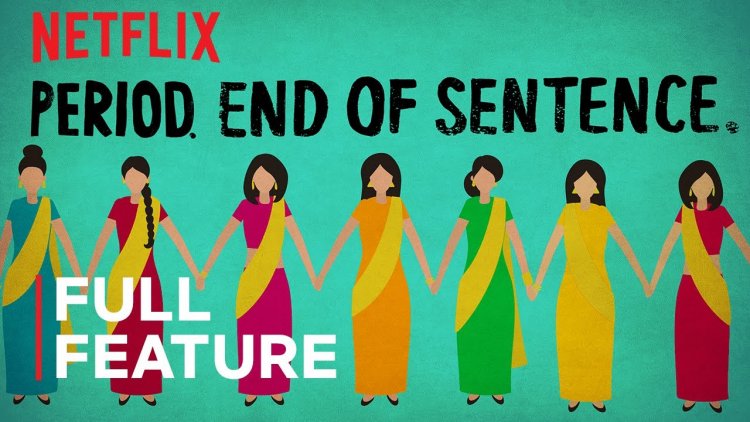Period. End Of Sentence.

Ratings: 4.8/5
Director: Rayka Zehtabchi
Producers: Rayka Zehtabchi, Guneet Monga, Melissa Berton, Garrett Schiff, Lisa Taback, Daviana Angelo, Sophie Ascheim, Douglas Blush, Maggie Brown, Michaela Carter, Sam A. Davis, Barb Demere, Tyson Fitzmorris, Bob Gatto, Carly Gatto
Genre: Documentary
Release Date: 5th April, 2018
Streaming Platform: Netflix
Cast: Arunachalam Muruganantham, Gouri Choudari, Sulekha Singh, Shabana Khan
Plot:
This is a 2018 documentary short film directed by Rayka Zehtabchi about Indian women leading a quiet sexual revolution. The film stars Arunachalam Muruganantham, Shabana Khan, Gouri Choudari, Ajeya, and Anita.
The documentary short follows a group of local women in Hapur, India, as they learn how to operate a machine that makes low-cost, biodegradable sanitary pads, which they sell to other women at affordable prices. This not only helps to improve feminine hygiene by providing access to basic products but also supports and empowers the women to shed the taboos in India surrounding menstruation – all while contributing to the economic future of their community.
The film is inspired from the life of Arunachalam Muruganantham, a social activist from Tamil Nadu, India.
Review:
Period. End of Sentence. takes place in a rural village some 60 kilometers outside Delhi, India, a place called Kathikhera, located in the Hapur District. The women living here are fighting every single day against the deeply rooted stigma of menstruation.
The film tells their story. Since the origin of these taboos, these Indian women had no access to sanitary pads or napkins. Then, what do they use?
Women commonly used discarded rags, which causes serious health problems including genital infections. The shame here has taken over the priority for health.
Girls just beginning to menstruate would miss school or drop out entirely from shame and disgrace, often having no prior clue that this natural biological process that happens with every single female out there.
In many cultures, women are not permitted at any time to enter holy places or handle sacred books for fear of contaminating them, turning into a herd of untouchables. It is actually quite ironic that in India, many of the temples which they could not enter were dedicated to female deities.
When a sanitary pad machine is installed in the village, the women learn to manufacture and market their own pads, empowering the women financially as workers and also helping them boost their self-confidence. They name their brand “FLY”. What’s more commendable is that the pads are 99 percent biodegradable.
Their effort is also enabled by fundraising efforts who raised the initial money for the machine, began a non-profit called “The Pad Project,” and are listed as producers of the film. Their Oakwood School chapter of Girls Learn International (GLI), an offshoot of the Feminist Majority Foundation, helps to educate and lift up the status of girls worldwide. As Sophia Bush says, “Teenage girls saw a problem in the world, they saw suffering, and acted on it.”
An Indian man by the name of Arunachalam Muruganantham invented the machine that transforms the cellulose in pine wood from local trees into a fluffy white mass that will become the absorbent innards of each pad. It is covered by layers of cloth and sealed, and all at a cost of about five cents apiece.
He, himself often goes to villages to install his machine and teach women how to operate it. Poorna Jaganathan says, “A simple product can give birth to a revolution.”
The film is on woman’s subject but it has a universal appeal. Director Rayka Zehtabchi says that it’s for women in India and in developing countries who feel ashamed because of their period, or are even just embarrassed to talk about their periods. But what’s been so successful with the film is that it also feels really universal in that it speaks a lot to men.
*NOTE: This film was the winner of the Academy Award for best documentary - 91st Academy Awards.
The film was also the winner of the Academy Award qualifying festivals for Best Short Doc at the Cleveland International Film Festival, the Traverse City Film Festival as well as many others including AFIFest, and Savannah.















































